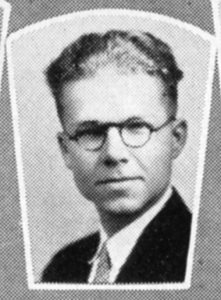
Washburn College was the most logical institution of higher learning for Dwight to attend. It had deep roots in Topeka, where he was born, where his parents had gone to college, and where his grandparents still lived. Established in 1865 as Lincoln College by the State of Kansas and the General Association of Congregational Ministers and Churches of Kansas, in 1868 it was renamed Washburn College. In 1941, faced with financial problems which threatened to close the college, a spirited public campaign passed a measure to make it a municipal-supported institution and it became Washburn University.
While at Washburn, Dwight had no financial support from his father. His grandmother Lydia Ott, however, helped with tuition and may also have paid his rent. If he had had the choice, Dwight would have majored in music while at Washburn. But, unable to afford the additional fees for a music major, he chose Spanish instead and minored in music theory. Choosing Spanish rather than some other subject, such as mathematics, may have been a pragmatic decision by him because he was helping to support himself by selling men’s clothing in the Mexican-American community in Topeka. He could earn three to four dollars in commission for selling a suit, and that became his primary source of income. “The fact that I was working among Mexicans was probably the determining factor in my having picked teaching Spanish as a career. If I had had the means for it, I would have majored in music. But music was beyond my means.”
Dwight also earned money by tutoring other students in Spanish on weekends in Kansas City where they lived. He combined these trips with visits to see his grandmother. One of the students was Claude Williams and the other, Leon Jordan, who became a powerful politician and civil rights leader murdered in 1970, possibly in a mob hit.
During the summer of 1928, which he spent in Versailles, he decided to earn some money by selling aluminum ware from door to door. (According to one website, “until the beginning of World War II, every bride anticipated receiving at least one aluminum wedding gift.”) What Dwight didn’t anticipate was a Stover city ordinance requiring door-to-door salesmen to be licensed. He was arrested by the Stover police for not having a license and his father had to be called to come get him out of custody. Nevertheless, The Aluminum Cooking Utensil Co., already part of Alcoa, for which he was working, was pleased by his work.
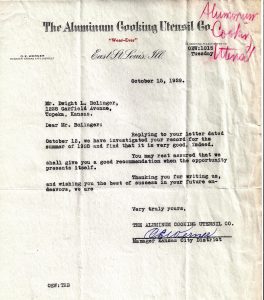
For lunch he ate at a mom and pop store near the campus, a meal of milk and cinnamon rolls accompanied by a borrowed copy of the Saturday Evening Post. For dinner he often made a meal of five cents worth of sardines and another five cents worth of cantaloupe. (Five cents in 1930, for example, would be worth seventy cents in 2017 according to one website.) In the depth of winter the librarian saw him without an overcoat and gave him one. And he never had any male friends.
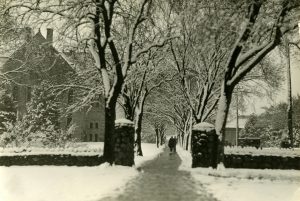
Dwight’s most inspiring teacher at Washburn who influenced him most was Trann Lamar Collier, professor of psychology and education, who was Dwight’s philosophy teacher. They would go to the Student Union and discuss philosophical points. Collier even invited him over to his house for meals. Dwight would say later that he owed Collier more than any other professor.
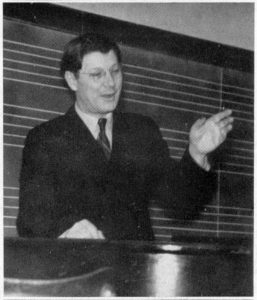

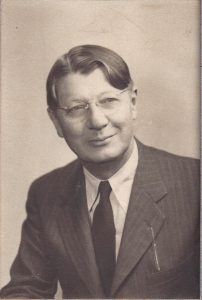
Harry Justin Coburn, an English teacher, had a very good ear for the language and instilled in Dwight a great deal of respect for the language.
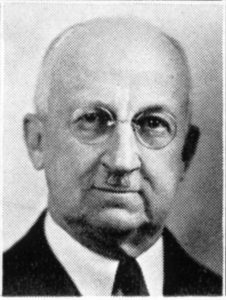
As a Freshman, Dwight had to take Mental Hygiene taught by Dr. Karl Menninger, a leading psychiatrist, in the 1926-27 school year.
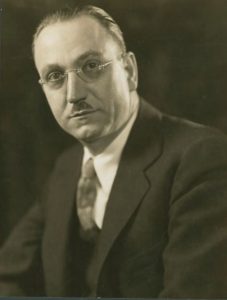
Two other professors, William Asbury Harshbarger in mathematics and an English teacher, had taught his parents a generation earlier. Even the librarian was the same. Dwight’s admiration for his teachers ran deep. He said of Washburn that it was a type of “New England outpost.”
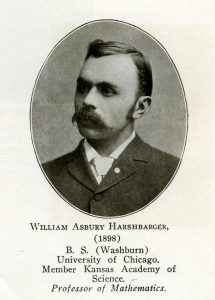
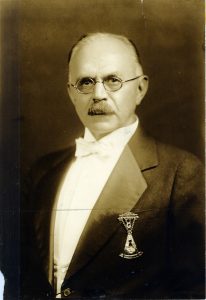
A Music Education Denied
Since he had to have a minor along with his Spanish major, Dwight selected music theory. He had no interest in learning to play the piano. After some lessons as a child, his grandparents had to drop the lessons for economic reasons. He simply never learned how to work in music nor how to read music properly. In Versailles there was a piano in a church auditorium on which he would practice during the summer of 1928-29. There was a recital once where he was supposed to play but fumbled midway and left in embarrassment.
What Dwight really wanted was to learn about composition. But, as he said, he never got to the point of being able to try his wings at composing. One of his music teachers quenched his ambition. He could imagine a symphony–the music came spontaneously–and he tried composing at the piano but what he wrote he described as “incomplete and inconsequential.” He likened himself to “a poet who never learned to spell.” His monograph, “The Symbolism of Music,” (item 35 in his bibliography, originally published in 1941 and reprinted in 2011), no doubt reflected his musical interests.
In 1930, the year he graduated, we find him serving as social chairman for the campus Spanish Club.
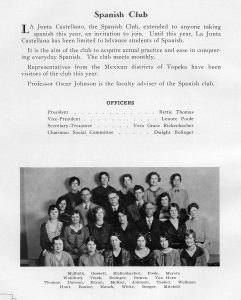
While at Washburn, his grades were virtually straight As. Only in his first year were there any Bs, in gym, astronomy, and music harmony. Not surprisingly, he was a member of the honorary society, Tau Delta Pi, a forerunner of Phi Beta Kappa.
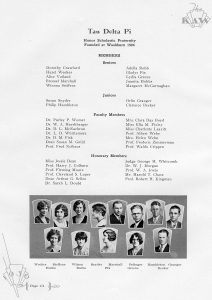
One anecdote Dwight told was about his calculus class, an early morning class. It was held in the basement of one of the buildings and the classroom was kept locked until class time. The day before, the professor would write out calculus questions on the blackboard that were to be discussed in class the next day. Although the classroom was locked, there were small, below ground level windows in a well that were not. One or more times Dwight climbed through one of the windows before class, filled the blackboard with all his calculus reasoning, then exited the same way he entered. When class began, there was a very surprised professor.
Dwight found math quite easy. He recalled doing one calculation in a different way than was taught. He felt he was on the brink of a very deep understanding but decided that math was not for him and no longer took math after his junior year.
At Washburn he was a complete workaholic. His studies were his only entertainment and he could not remember ever going to a movie. The only date he ever had was arranged by the Dean of Woman with her niece. He found it memorable because he carried the young lady over a puddle of water, much to her amusement. Dwight had an attitude of fatalism, thinking he would never have a romantic involvement.
He had no ability in sports. He carried a basketball like a football. When the teacher gave him a “C”, Dwight’s hurt look prompted the instructor to raise the grade.
On June 3, 1930, Dwight graduated from Washburn summa cum laude, the only one in his class, plus Departmental Honors in Spanish and Music Theory.
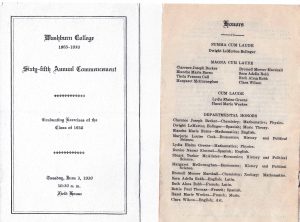
During his time at Washburn his political views began to form, influenced by his discussions with Tran Collier and a subscription to The Nation magazine. During his first two years at Washburn he roomed with the Buerer family, friends of his grandparents, at 2733 California St. in Topeka, taking a street car to get to school. He remembered enjoying music on a radio, a newfangled device. To power it he rigged up a battery with strips of aluminum in a chemical mixture. During cold weather his room was frigid. To warm the bed he equipped a light bulb with an extension cord and put the bulb in the bed only to set the bed on fire. Going to the bathroom required going up and down two flights of stairs. In desperation he resorted to peeing out the window (at night, of course).
Colorado During the Summer of 1930
Before beginning work on his M.A., he spent the summer of 1930 living in a shack he built in Colorado, using a roll of tar paper to cover the top and sides. To keep his food away from ants, he stored it on a board suspended from the ceiling by wires coated with resin. There was an opportunity to do a lot of hiking. His memories included a rancher’s windmill pumping water into a trough, being accosted in Laveta, Colorado by someone asking him, “Have you been saved?”, and a woman who invited him to “Come in and rest awhile!”
Master’s at University of Kansas, Lawrence, 1930-1931
The year of 1930-31 he spent working on his M.A. at University of Kansas at Lawrence, Kansas. His selection of that campus was because they offered him a scholarship for the year of $400 (equivalent to $5618 in 2017 dollars). It was at KU that he felt closer to his fellow graduate students than ever before. The teaching staff was very congenial. He even had a romantic interest in a couple of girls, Ada Wiley and Celia Epstein. A colleague in later years, Larry Kiddle, had preceded him at KU by one year.
In April 1931 Dwight played a minor role, that of Leoniso in the Cervantes play, Estremés de La Cueva de Salamanca. Leoniso was a friend and traveling companion of Pancracio. The play was part of a program, Dia de Cervantes, sponsored by the Department of Spanish and Portuguese. Below is the program.
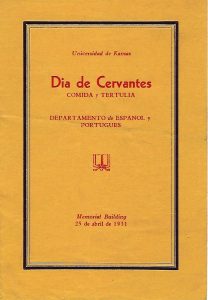
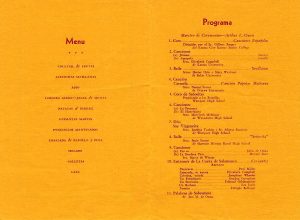
While at KU Dwight’s quarters were in a second-floor sun porch at a rooming house (shown below) at 936 Maine St. It was conveniently located, making it possible for him to walk to campus.
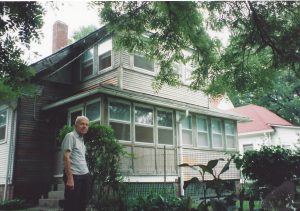
One of Dwight’s memories was of a mathematics graduate student who also rented a room in the same boarding house. He looked down his nose at liberal arts majors like Dwight, even referring to him as “that damned Spaniard”. But one time the student was stumped by a math problem and sought out Dwight’s help. Dwight showed him how to solve the problem.
The topic of Dwight’s thesis was the philosophy of the Spanish novelist Pio Baroja, a subject suggested to him by the departmental chairman, Professor Owen. Dwight received his Master’s in absentia because he had not finished the thesis by the end of term.
Next stop, the University of Wisconsin at Madison.
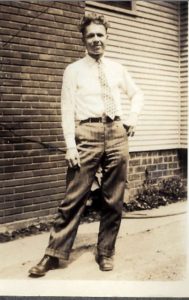
Doctorate at University of Wisconsin, Madison, 1931-1936
Dwight went to Wisconsin in the Fall of 1931, financially aided by the Wisconsin Alumni Research Foundation in exchange for research he did on warfarin, a substance used as blood thinner and rat poison.
In Madison Dwight lived on the second floor of a rooming house which looked out at Lake Mendota. The lake shore was terraced. During winter there would be ice boats on the ice and fishermen ice fishing. He would go for walks on the wooded shore. He ate some meals in his room, others at the Student Union. The rooming house had a music room and he could borrow stereo records.
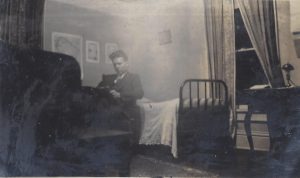
He also became a research assistant under Professor Antonio Solalinde, know as”Solie”. Solalinde would invite his students to his home where his mother would play for the guests. Solalinde’s mother-in-law was a general in the Dominican Republic. In his academic life he was a medievalist with a specialty in the epoch of Alfonso X of Castile, known as the “Alfonso the Wise,” 1221-1284. According to a Wikipedia article,
“Alfonso X fostered the development of a cosmopolitan court that encouraged learning. Jews, Muslims, and Christians had prominent roles in his court. As a result of his encouraging the translation of works from Arabic and Latin into the vernacular of Castile, many intellectual changes took place, perhaps the most notable being encouragement of the use of Castilian as a primary language of higher learning, science, and law.”
Professor Solalinde collected the vocabulary used in medieval Spanish in the time of Alfonso the Wise. His project was underway in 1931 and, despite Solalinde’s premature death in 1937, by 1991 it was due to see the light of day under Lloyd Kasten, who had been a fellow student with Dwight at Wisconsin.
The two most influential professors during Dwight’s time at Madison were Solalinde and Joaquin “Quin” Ortega. In a paper read at a meeting of the American Association of Teachers of Spanish and Portuguese in 1947, we learn that Ortega, as chairman of the Department of Spanish and Portuguese at Madison, was largely responsible for its phenomenal growth in student enrollment in the department and that it was through his influence that Antonio Solalinde was brought to Wisconsin to establish the Seminary of Medieval Spanish Studies.
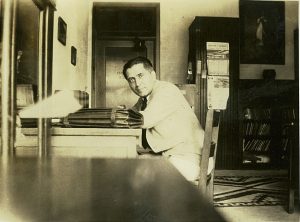
At the same time as he was doing research for Solalinde, Dwight was taking classes, including a minor in philosophy and teaching one or two sections of elementary or second year Spanish. His minor brought him into contact with Professor Max Otto, who would become chairman of the Department of Philosophy in 1936.
While at Madison, Dwight became close to Robert and Nina Duncan, Larry and Eileen Kiddle, and Chuck Newcomer. Dwight became acquainted with Nina when she was working as librarian in Madison.
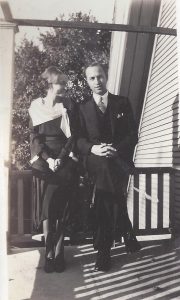
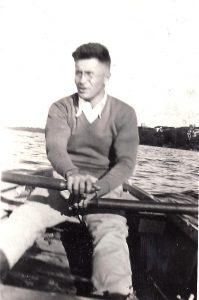
By 1933, Dwight’s aunt Grace and her husband John Albins had moved from Colorado to a property on the Agua Fria River near Canon, Arizona, and Dwight came to visit.
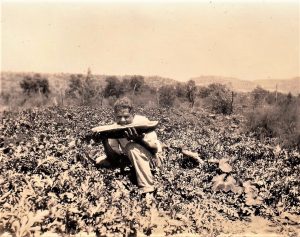
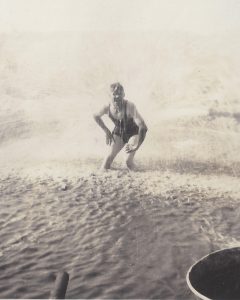
It is from here that we move on to the next chapter in Dwight’s story, his meeting and wooing Louise Schrynemakers.